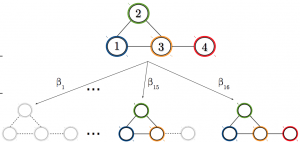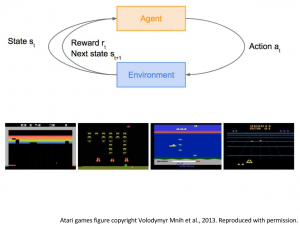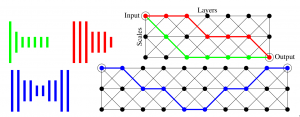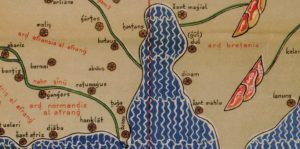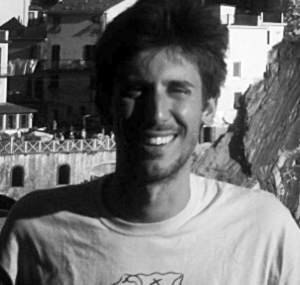Friday 28th September, 2018 at 2pm. Location TBA The first Phd / Postdoc seminar of the 2018 / 2019 calendar will follow the work of DANTE’s Marija Stojanova, who will present her recent research on wireless networks. In particular, we will discuss conflict-graph based models of Wifi. Abstract – “We describe a performance modeling method that …
Category: Seminars
Sep 20
DL Journal Club: “Human-level control through deep reinforcement learning” digest by Jacobo Levy-Abitbol
Friday, September 21st, 2018 at 11am – LIP meeting room M7 3rd floor Jacobo Levy-Abitbol will be giving a presentation of the paper “Human-level control through deep reinforcement learning” published by Mnih et al. in Nature in 2015. From the abstract: Here we use recent advances in training deep neural networks to develop a novel …
Jun 28
PhD and Postdoc seminar: “Graph-based semi-supervised learning for classification” by Sarah De Nigris
Thursday, June 28th, 2018 at 3pm – IXXI Conference room M7 Sarah De Nigris will present her latest work on graph-based semi-supervised learning for classification. The talk is the second in this year’s series of monthly presentations aimed at diffusing graduate research in the DANTE team.
Jun 12
DL Journal Club: “Geometric deep learning on graphs and manifolds” digest by P. Borgnat after M. Bronstein’s talk
Friday, July 13th, 2018 at 1:30pm – IXXI Conference room M7 Pierre Borgnat will be giving a (simplified) presentation of the tutorial “Geometric deep learning on graphs and manifolds” done by Michael Bronstein at the Graph Signal Processing workshop held at EPFL, june 6–8, 2018 . We should prepare for “a mix of Convolutional Neural …
May 25
PhD and Postdoc seminar: “Threshold dynamics on multiplex networks” by Samuel Unicomb
Thursday, May 25th, 2018 at 4pm – IXXI Conference room M7 Samuel Unicomb will present his latest work on binary state dynamics on complex networks. This work was carried out in collaboration with Márton Karsai, Gerardo Iñiguez and János Kertész, and extends recent results by the same authors on stochastic processes on edge-heterogeneous networks. A …
Apr 23
DL Journal Club: “Convolutional Neural Fabrics” digest by Sébastien Lerique
Friday, May 9th, 2018 at 2pm – IXXI Conference room M7 Sébastien Lerique will give a presentation of the paper “Convolutional Neural Fabrics” published by Shreyas Saxena and Jakob Verbeek at NIPS 2016. This paper proposes a method to construct neural network architectures by training a fabric of possible architectures instead of relying on expert …
Jul 19
Seminar by Mathieu Avanzi : Cartographier les régionalismes du français
Where: salle R174 du site Descartes de l’ENS When: le mardi 25 juillet à 9h30 Mathieu Avanzi, FNRS & Université catholique de Louvain Résumé : Le but de cet exposé est double. Dans un premier temps, je présenterai la méthodologie suivie pour recueillir les données utilisées pour mettre au point les différentes cartes qui illustrent …
Jul 04
École d’été de cartographie et de visualisation
Date: 3 au 5 juillet 2017 – Enssib Où : ENSIB, Lyon Programme : http://barthes.enssib.fr/ECV-2017/ Organisateur : Eric Guichard Constat Les méthodes et outils de visualisation ont depuis 15 ans pris un grand essor en physique et en informatique. Elles soulèvent néanmoins des interrogations de plusieurs types: fiabilité de la représentation, puisqu’il s’agit de projeter …
Apr 06
Seminar by Federico Battiston: Structure and dynamics of multiplex networks
Federico Battiston from Queen Mary, University of London will talk about: Title: Structure and dynamics of multiplex networks Abstract: Many real-world complex systems consist of a set of elementary units connected by relationships of different kinds. All such systems are better described in terms of multiplex networks, where the links at each layer represent a …

